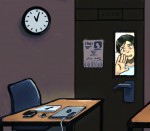With finals fast approaching, UCLA students have begun looking for quiet rooms to hunker down and spend numerous caffeine-fueled hours cramming for tests, papers and projects. With libraries filled to the brim, empty classrooms can look like the perfect place to set up shop for a successful study session.
Until they auto-lock, that is.
UCLA’s numerous classrooms give students plenty of study space options. However, no policy governs the use of classrooms for open study and few signs are posted with official building hours. Locks on these classrooms can be automatic, meaning if a student is not aware of the time the building closes, they could get locked out.
This makes utilizing empty space on campus a stab in the dark, as a quick trip to the bathroom could lead to students being locked out with little obvious recourse.
UCLA must formalize a process for open study in unused classrooms, in order to reasonably accommodate a growing demand for study spaces – especially around midterms and finals season.
Nurit Katz, chief sustainability officer for UCLA and executive officer of Facilities Management, said that all general assignment classrooms – or classrooms overseen by the registrar and not a specific department – with the exception of Haines Hall and a few rooms in Broad Art Center, auto-lock at 11 p.m.
The big issue here is that with very little official signage of hours, classrooms can lock without students even noticing. All it takes is a quick water or bathroom break, and suddenly students are faced with a nasty surprise. Getting locked out is especially stressful during midterms and finals seasons, as students may not have access to important study material mere hours before grade-making exams.
Katz said students who have left their belongings in a locked general assignment classroom can call the Facilities Management customer service line so either Custodial Service or Hardware Shop can come and open the door. This process becomes much trickier during weekends and holidays when custodial staff may not be working in the building. In this case, Katz said that a request to open a door might require a facilities service request, an online form that requires students to provide information such as department codes, blanket numbers (a number Facilities Management uses to identify department accounts) and department accounting information – information that students are unlikely to know, let alone understand.
This makes it nearly impossible to retrieve locked items on a night when Facilities Management is not working its usual hours. Given that finals for students start as early as Saturday, it is entirely plausible that Bruins would be studying late into the night on days that would require a facilities service request to open the door. In such a situation, students could be forced to wait until the next morning to retrieve their important belongings – something that’s not always viable when you need your car keys to drive home or your Bruincard to take an 8 a.m. final.
Moreover, Facilities Management’s policies are not widely disseminated on campus and the university has no policy governing the use of study spaces for open study. While there are a few signs indicating that buildings close at 11 p.m., they are few and far between. Furthermore, there is nothing indicating who specifically to call if your belongings are locked in a classroom. So even though there may be a recourse, students don’t know about it.
He Heejoon, a first-year chemistry student, said she did not know about Facilities Management’s policies about how to open locked classroom doors. Caludi Vembryani, a third-year chemical engineering student, said she was not aware classrooms close at 11 p.m., adding she would not know who to call if her stuff was locked inside a classroom.
By installing more signs inside and outside buildings to notify students about its policies, the university would not only cut down on unnecessary student stress but also reduce the number of instances of Facilities Management being called away from their work to unlock a door.
According to the Registrar’s Office, no policy exists regarding the open use of classrooms for studying. As a result, it is plausible to argue that classrooms are not available for free study, so students who lock their stuff in them should not get special accommodations. However, there is nothing posted in buildings that indicates this, and students are not expressly forbidden from using the classrooms for study. At the very least, the university has an obligation to inform students that they cannot study in empty classrooms if they wish to prohibit it.
With so much underutilized space on campus, formalizing a policy for using empty classrooms would be an easy and cheap way for the university to expand spatial resources for students and save itself the hassle of late-night emergency requests from stressed out Bruins.
The space is there to use. All UCLA needs to do is make sure the door is open.
